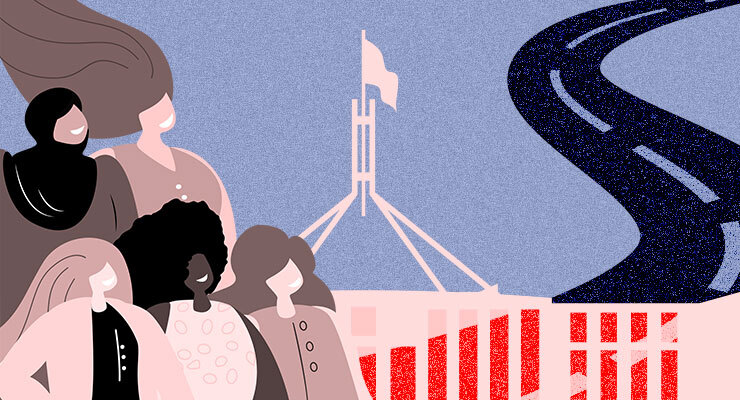
The pundits have spoken. This election showed the power of women. Invisible in cabinet, assaulted and insulted on the job, and tired of having their burdens ignored — particularly after COVID — they didn’t get mad, they got organised.
Taking a page from history, they showed Scott Morrison and his government the door in a way that the Coalition will find hard to forget.
As one headline put it, hear us roar.
But forgive me for not popping the cork on the bubbly yet. I’ve been here before, basking in the “women are doing it for themselves” euphoria that follows female-driven achievements, only to watch resolve and alliances unravel once the imperative of the moment has passed.
Whether it’s the removal of the effective ban on the abortion pill RU486 (accomplished by a cross-party group of female senators in 2006) or the banding together of professional women in former blue ribbon Liberal seats to help evict a risible prime minister from the Lodge, I know the odds are that we’ll return to form: namely allowing what divides us across class, racial, ethnic or religious lines to prevent us working in concert to address the disadvantages we suffer as women.
Will this be our fate again? Make no mistake about it, this is a key lesson of second-wave feminist history — although on the upside we have never had such broad institutional backing for women’s ambitions before.
The Greens and Labor are on record supporting many cradle-to-grave changes women need to realise their ambitions for equality. This includes closing the gender pay and retirement income gap, improving wages and conditions for work in healthcare and education mostly performed by women, reducing childcare costs, and stopping harassment and violence against women at home and at work.
The Greens — bless their hearts — also explicitly support a woman’s right to choose. They’ve also got policies designed to get men to share parental leave which research shows sets the stage for more gender-equitable parenting throughout a child’s life. The teal independents are on board with that too.
Plus it’s hard to imagine a savvier and more qualified group of women to whom the baton will be handed. Labor’s Minister for Women, Katy Gallagher, has been a champion for abortion and women’s rights throughout her political career, and the Greens’ Larissa Waters and all the female independents, teal and otherwise, are more than impressive.
But Parliament is a busy and contentious place, with bucketloads of issues and their advocates jostling for attention and space. Will women’s issues — so front and centre when it came to winning the campaign — retain priority or will they slip down the agenda for lack of sustained external pressure and effective agitators?
Time will tell. Whether the legislation required will be drafted and debated and the announcements promised are made and adequately funded.
For now, we wait.








I know I’m hopeful Leslie, but still determined. My main thought is that we need to keep the networks going that led to the March 4 Justice. In 12 months, if women can’t see any improvements, then we march again. And if we march in solidarity then I have hope that our current Government will listen, not deride.
Same principle goes for Climate Policy, and might need to be taken up for Health (because Hospitals nation-wide are in a shocking state right now). Applies to any cause really – so long as we have a Government that is prepared to listen. Fingers crossed they live up to our expectations!
With many more women in Parliament I’m hopeful that progress will occur. It’s very early days, of course, and yes, other issues will clamour for attention. However, I believe frequent reminders to female representatives will see our agenda addressed. We just have to be patient but persistent.
https://m.pbs.gov.au/search.html?term=MIFEPRISTONE%20%28%26%29%20MISOPROSTOL&analyse=false
Here’s it’s PBS listing
Gotcha. You’re right.
I don’t see anything wrong with you using the term by which everybody knows it and has done so for years, Leslie
Why is this an issue? Am I missing something here?
I’m dying to know, how has Lizzie transgressed?
We were promised more Labor MPs and more female MPs would lift the state of politics and what happens? Labor’s female MP Tanya Plibersek forced to apologize to Dutton within days of forming government. Off to a good start ladies!
Oh please. Let’s count the insults to female politicians from males, shall we? And she immediately retracted. Expect better of them too.
I reckon Tanya apologised with a smile, and Albo had a hint of a grin as he accepted it..
We are off to a good start, and I am certain Albo and his team will work hard to keep their promises and work with all the brilliant new women in the parliament. But they need to negotiate in good faith too.
Please, stop calling it RU486. That is nothing more than it’s research designation for use in preliminary trials. It has a name, mifepristone. Use it.